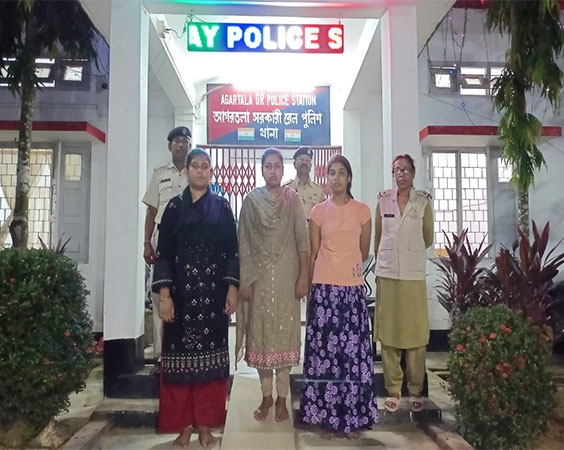Three Bangladeshi women were detained at Agartala Railway Station on charges of illegal entry into India. The arrests, made by Tripura State Police in coordination with railway security forces, occurred on November 12, 2024. The detained women, whose identities have yet to be fully disclosed, were apprehended while attempting to board a train bound for Kolkata. This incident has shed light on the ongoing issue of illegal immigration along the India-Bangladesh border, raising questions about the security and social concerns that arise from such incidents.
Incident Details
According to Tripura Police, the women, aged between 20 and 35, were found suspiciously moving around the railway station, prompting security personnel to interrogate them. During questioning, the women failed to provide valid identity documents, revealing that they had entered Indian territory without any authorized documentation or visa. They confessed to having crossed the international border illegally through the riverine regions of Bangladesh, which are often vulnerable to unauthorized movement due to limited security infrastructure.
The women were reportedly planning to travel to Kolkata, a city known for its significant Bangladeshi population. Sources suggest they might have been on their way to secure employment or join family members already residing in India. Following their admission of illegal entry, the police detained them under the Foreigners Act, 1946, which governs the conditions for legal entry and residence of foreigners in India.
Background and Context of Illegal Immigration
Tripura shares a 856-kilometer border with Bangladesh, much of which passes through challenging terrain such as rivers, hills, and forests. Due to these geographical factors, parts of the border remain difficult to monitor, making them prone to infiltration. While the Indian government has undertaken extensive measures to fortify border areas through fencing and the deployment of the Border Security Force (BSF), certain sections remain porous, allowing unauthorized individuals to cross over.
Illegal immigration between Bangladesh and India has a long history, driven by a mix of economic aspirations, family connections, and sometimes political or social conflicts. Many immigrants cross into India in search of employment opportunities, better living conditions, or to join relatives. However, these unauthorized entries raise security concerns, especially amid rising concerns of trafficking and organized crime networks operating in border regions.
Law Enforcement and Border Security in Tripura
The arrest of these three women has brought attention to the efficiency of border security and the challenges faced by law enforcement in Tripura. The state has been actively working to strengthen surveillance along its border with Bangladesh. However, due to geographical limitations and resource constraints, illegal crossings continue to be a recurring issue.
In response to this incident, the Tripura Police and BSF have promised increased patrolling in sensitive areas and reinforced security at transportation hubs such as railway stations. Officials have also stated that intelligence gathering will be strengthened to identify and prevent unauthorized entry attempts.
Despite these assurances, border security remains a complex challenge. The cost and logistics of maintaining a fully secured border are significant, and the difficulties are compounded by the socio-economic ties that exist across the India-Bangladesh border. Many individuals living near the border share cultural and familial bonds with people on the other side, adding to the motivation for crossing over.
Social and Political Repercussions
The issue of illegal immigration is a sensitive topic in India, with political parties and social groups often divided over how to address it. In states like Tripura, which has a unique demographic composition and a history of migration from Bangladesh, there are differing opinions on how to handle illegal immigrants. Some view them as people in need, while others argue that their presence strains local resources and raises security concerns.
In recent years, the Indian government has been taking steps to crack down on illegal immigration, including the implementation of the National Register of Citizens (NRC) in Assam. While the NRC has not yet been expanded to Tripura, incidents like this recent arrest of the three Bangladeshi women underscore the potential for similar measures to be considered in the state.
Next Steps for the Detained Women
The detained women are currently being held at a local police station in Agartala and are awaiting legal proceedings. Under the Foreigners Act, they face possible deportation back to Bangladesh. However, this process can be lengthy, as it requires coordination with Bangladeshi authorities and verification of the detainees’ nationality. Until then, they may remain in detention or be transferred to a detention center.
Officials have indicated that the matter will be handled according to Indian law and that they will cooperate with Bangladeshi authorities as needed. The incident may also prompt discussions between Indian and Bangladeshi border security agencies to address the persistent challenges of illegal immigration and improve cross-border coordination.
The arrest of three Bangladeshi women at Agartala Railway Station for illegal entry into India highlights the ongoing security challenges faced by states along the India-Bangladesh border. While the Indian government has implemented various security measures, the complex socio-economic and geographical dynamics make securing the border a daunting task. This incident serves as a reminder of the need for continued vigilance, effective law enforcement, and improved cooperation with neighboring countries to address unauthorized border crossings and maintain the safety and security of the region.




